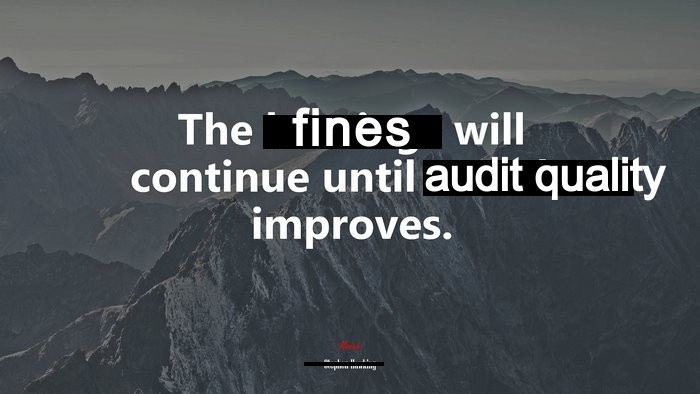Financial Times has reported that Financial Reporting Council head Sir Jon Thompson — who last year told firms complaining about audit fines to get gud (paraphrased) — has no sympathy for audit partners across the pond who can afford Ferraris but can’t afford the staff and training necessary to perform acceptable audit work.
Auditors who think robust regulation of their sector is disproportionate deserve “the world’s smallest violin”, the head of the UK accounting watchdog has said.
Sir Jon Thompson, chief executive of the Financial Reporting Council, told a private industry meeting earlier this year that close scrutiny was appropriate for auditors who earn hundreds of thousands of pounds a year and “can buy a Ferrari”, people who were in the room or were later briefed on his comments told the Financial Times.
Thompson said that if auditors did not want to face such pressure, they should do a better job, these people added. Attendees were “taken aback” by Thompson’s comments, said one person present.
No one should be taken aback by that last comment, he’s said it before. “It’s no good complaining about the fines,” he said in an interview with the Financial Times. “The solution is entirely in [the audit firms’] hands. Do a good audit and you don’t get in trouble with us.” It’s only recently that FRC has taken a heavier hand in picking on supervising the mid-tiers which may be why some are horrified by his comments. It’s only at Big 4 firms that partners take home more than a £1 million and only at Deloitte and PwC; KPMG partners received £757,000, an increase of 10% from prior year. Meanwhile, partner pay at BDO was more like £647,000 (USD $803,400) and £579,000 at Grant Thornton (USD $719,000).
The crackdown on shoddy auditing is profession-wide, meaning it includes partners at far less lucrative firms than Big 4, and it is something Thompson seems personally committed to. He likens firms complaining about poor inspections to “blaming the doctor for saying you’re ill.”
People on the receiving end of FRC scrutiny suggest the regulator borders on bully:
Meanwhile, FRC deputy chief executive Sarah Rapson was asked by a senior PwC partner at a separate meeting last week whether the regulator was reviewing its approach, in light of reports that a headteacher had taken her own life after an inspection by education regulator Ofsted, attendees told the FT.
“I’ve seen people suffer genuine health problems,” said one audit partner, who felt that Rapson “didn’t really answer” the question. FRC inspections, whose results are published on an aggregate basis without identifying individual auditors, have become “an emotional drain”, said an audit partner at another large firm.
A senior accountant from a smaller firm in attendance at the above meeting said comparing auditors to teachers was “self-serving” on the part of Big 4 firms and comparing Ofsted (Office for Standards in Education, Children’s Services and Skills) to the FRC was “quite a clever way of trying to get the [FRC’s] language toned down.” The senior accountant then added that audit partners are paid better than headteachers.
Headteachers, being of advanced senior status, receive the highest teaching salaries. Here are some averages:
- England (excluding London) and Wales – £50,122 to £123,057
- London – £51,347 to £131,353
- Scotland – £52,350 to £99,609
- Northern Ireland – £47,381 to £117,497.
Yeah, that checks out.
The FRC handed down record fines for the 2021/2022 fiscal year: £46.5 million (USD$58.7 million) before settlement discounts, up from £16.7 million the year before. More than half of these were to KPMG alone. The huge increase in fines “reflects the seriousness and high number of cases concluded,” said the FRC. “It also reflects the FRC’s growing capability to take on the large and complex cases which are an increasingly prominent feature of its work, supported by a 23% growth in the Enforcement Division’s headcount.” The majority of FRC enforcements were due to lack of audit evidence and a lack of professional skepticism.
“When deciding sanctions, and whether they will be made public, the FRC does take into account representations about an individual’s personal circumstances, including their mental health,” said Thompson in a statement about his harsh words.
“The FRC has always applied a proportionate approach when discharging its duties and statutory responsibilities as a regulator acting in the public interest and has taken action to not publish when there are significant concerns about the impact on an individual,” he added.
UK watchdog chief shows little sympathy for auditors who ‘can buy a Ferrari’ [FT]


